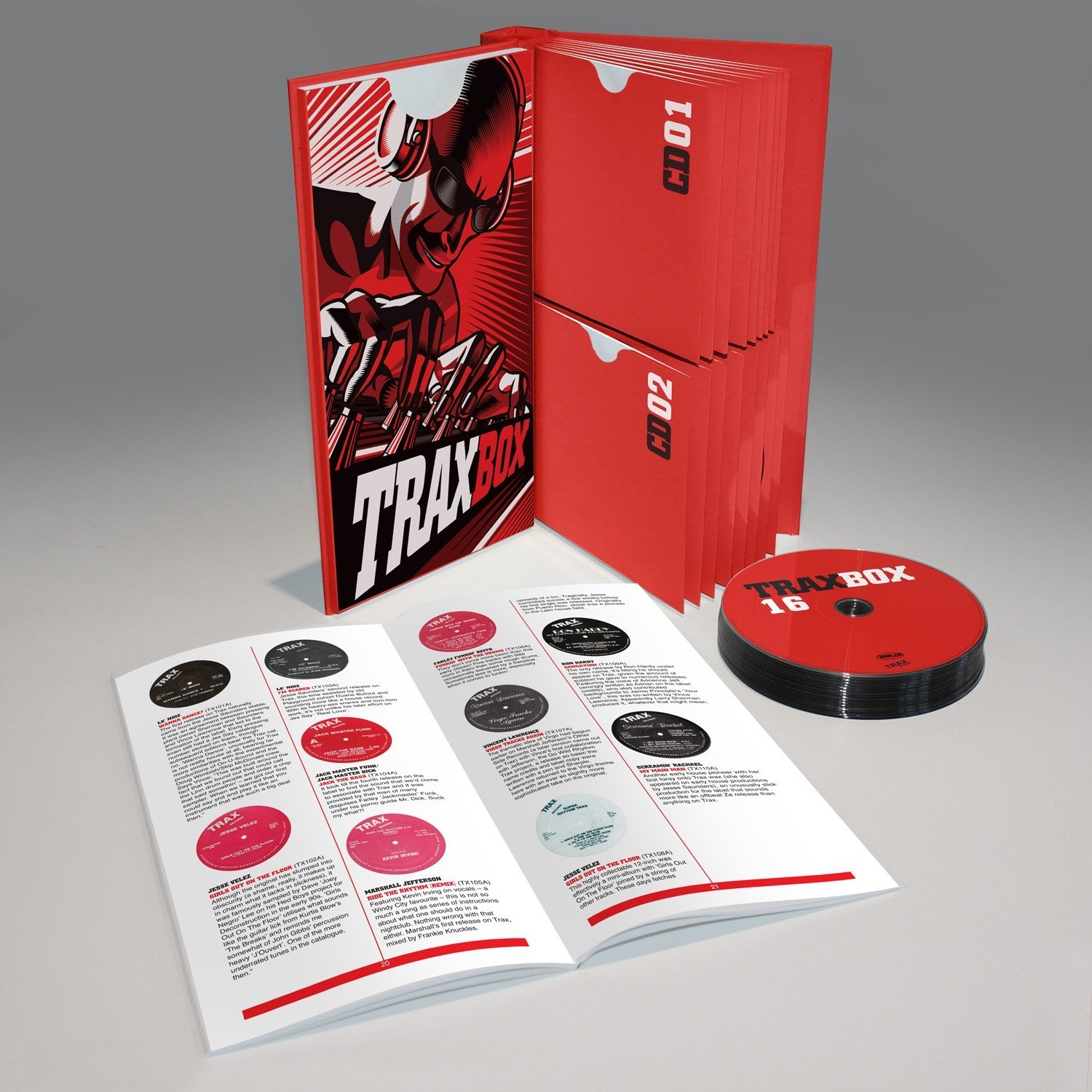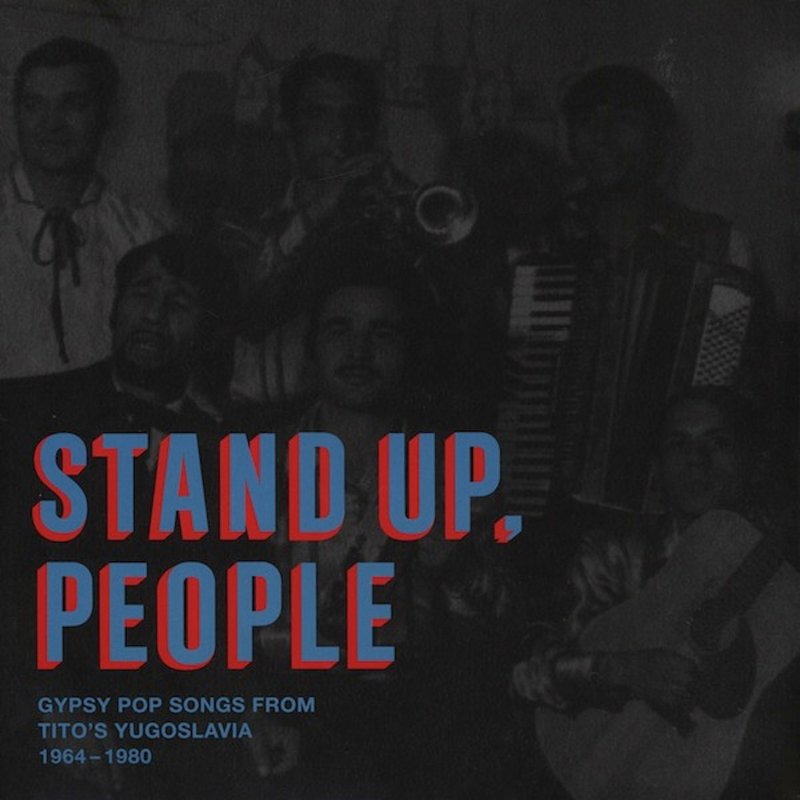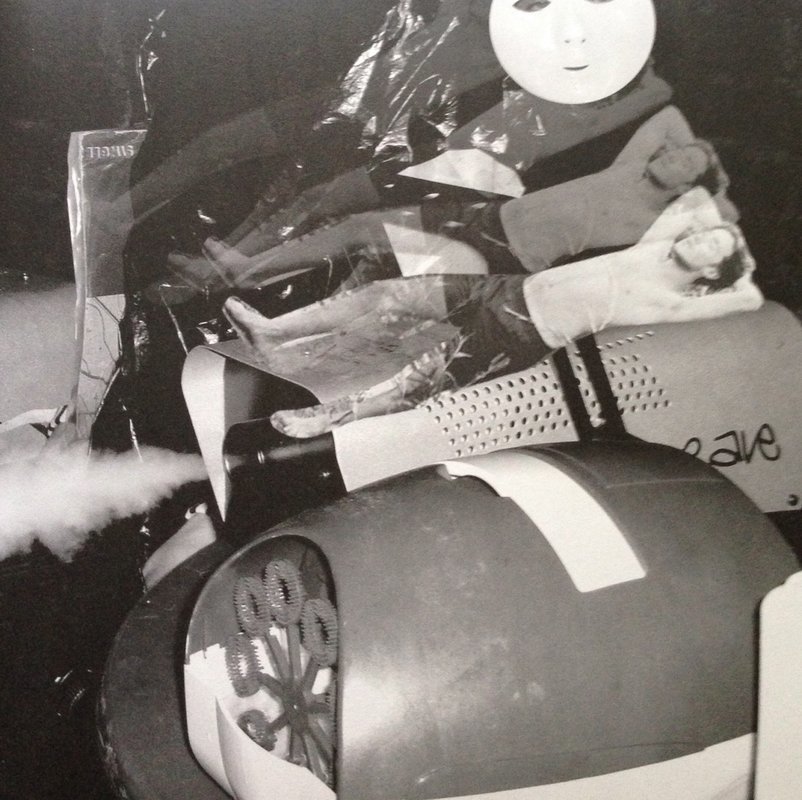Review
Trax Records
Trax Box

Right. Lets get the elephant in the room out of the room as quick as possible. The artwork. It's horrible, but I don't listen to music so I can look at artwork. Yes, I like looking at nice things but this is about the music and what is inside. Later Nelly.
I was going to say if you like House music and have any interest in its history you need this, but lets be honest you don't 'need' anything in life bar food, sex, family and a cuddle from time to time. So I'll start over.
If you like House music this is a very nice thing to look at owning. Harmless, the label here, have done the correct thing and remastered the whole Trax catalogue and presented it as series of CDs - A & B sides. What this means is that in this box that costs something like £50, you get every release from TX101 (I had to look at that I didn't know it off by heart honest) through to TX179. 75 records of gold period House music remastered onto CD. This makes me happy for one as every digital copy I've ever had of Mr Fingers' 'Can You Feel It' has not been right.
The chaps at the label have also created a 100 page booklet that runs alongside the compilation discussing each release and giving the label a context in which to live. So what is that context?
Trax as we know was built on crappy recycled vinyl and dodgy business practice but also born at the birth of house with some of the most cutting edge producers to this day on board. Frankie Knuckles, Marshall Jefferson (hero), Adonis, Jamie Principle, Master C& J, Farley 'Jackmaster' Funk, Phuture and Larry Heard a.k.a Mr Fingers.
You sort of get so used to hearing this music (and seeing it around you) that sometimes you have to stop, take a step back and reappraise. This is what they've done and when you look at it (and it is a recurring theme for me) as the sound of machines with soul given life by a new genre of music and young kids sharing equipment around then you start to see it all with a fresh set of eyes.
I love the story of Marshall Jefferson going out and spending a huge amount of money on equipment he had no idea about or how to work and all his mates cracking up at him but as they say he who laughs last and one thing Marshall Jefferson can do alongside make a classic house record is laugh. And he's loud. Anyway, we digress. The book that comes with this set starts with the quote, 'The street finds its own use for things' from William Gibson. You can apply that to many things (skateboarding for example) but here lets talk 303's, 606's, 808s and 909s. Thank you Roland. You made a lot of young people very very happy.
We know Disco bred House and we know the story of Farley's foot (Farley Funk putting a kick under Disco records and creating a genre) and we know the story of 'On & On' by Jesse Saunders laying claim to be the first record to make it to wax, but alongside this you had the Marshalls, the Larry Heards and the Jamie Principles (a bedroom Prince if there ever was one). People with soul bones itching to get their music out as quickly as possible to hear it in the local nightclubs or hopefully at the hands of Ron Hardy.
The producers put House and its creation at the feet of Hardy. A DJ with a notorious attitude to life and a high energy sound but also one with the ability to drop a slow number like 'Maureen' by Sade or a weird German pop record and make it work. So we have Farley and his foot, and Marshall (and his ecstasy strings) making tracks and getting them played on cassette via Hardy. This in turn leads to labels getting on board and Trax starting. Maybe a quick buck was seen at the time but the scale of sales must have taken them by surprise at the label. I imagine they saw it as very much a localised Chicago scene but when the phone starts ringing from London and you have Pete Tong at a major label wanting to sign your artists then you know you're onto something. Trax did and they got it right over and over again.
And then along comes a young DJ Pierre with a box made for bass practice that he had abused, and as Gibson is saying, took somewhere totally different to that that its creator intended. The 303 was, and is, the sound of Acid House. It's even the name. And as names go I am not sure you get a tighter fit. It squelches and makes total sense over a very simple raw rhythm. Pierre sussed this and let it ride. If you've never er released your body to an Acid record on the dance floor with 100 like minded souls then you are missing one of the finest things in life.
So how did it end? Well the business got messy, people felt they weren't being paid but that's not the point here. As Jefferson says, 'Everybody in Chicago at that time got their education down at Trax Records.' This box is the roots and history in one place and it'll be worth every penny of your hard earned. This box IS House music. Let's go.
The Trax Box is out now on Harmelss Records via Demon.


